Paid focus groups involve sharing your opinion on market research and can be a great way to earn extra money. Companies often like to get feedback on a product or service before launch, so paying for honest opinions can be invaluable.
We’re always keen to find new side hustle ideas to share with our readers. One of the great things about this side hustle is you don’t need any particular skills or experience, just some time and lots of honesty. Focus groups used to be largely in person, but in recent years, many have turned online, making it a fantastic way to make money from home.
There are a few things to learn before you launch yourself into signing up, so let’s get into the details. Find out how to apply, what you’ll be expected to do, and how much you can (realistically) make.
Market research agencies at a glance:
What are focus groups?
Focus groups are a type of paid market research that consists of a group of people who are asked for their opinions. These groups help companies gather honest opinions on their products and services. This could be watching videos and adverts or user experience testing for a new website. Sometimes you’ll simply be paid for your opinion on a specific topic like private renting or action movies.
Why do companies bother with them? Instead of launching their product blind, the company gets to hear real feedback and tweak accordingly. In return for giving your honest opinion, you’ll get paid, usually in cash or gift vouchers.
Focus groups can vary widely in the number of participants and the topic you’re asked for opinions on. Sessions can take place in person or online and are usually anywhere between 45 minutes to two hours.

Who can apply?
The only requirements for focus groups are being at least 18 years old and resident in the UK. Here are some other requirements that are sometimes specified, but always good to have.










Each and every focus group will differ in the kind of person they’re looking for. For example, if a focus group centres around the topic of being a parent, you won’t get picked if you don’t have children.
Good to know
Some of the market research companies may ask if you currently or have ever worked in marketing, journalism, or PR. If you do, you may be disqualified from some topics.
How to get started
So how do you join and take part in focus groups? Here’s a quick rundown of the steps involved to get started.
1. Sign up for as many agencies as you can
Focus groups recruit members via market research agencies, which we’ve got a list of here. There’s no limit on how many agencies you can sign up for, so go ahead and join as many as you can.
2. Complete your profile
Fill out your profile with basic information like your name, date of birth, address, and employment status. This helps agencies get a better idea of the projects that will be relevant to you. Other information you’ll be asked for can include marital status, household details, pay bracket, education level, and health conditions.

3. Apply for projects
Agencies will often send email invitations for focus groups, but you can also browse their website for current projects. Each project listing will give you an overview of the topic, whether it’s online or in-person, and the date and time of the focus group.
Make sure you fit what they’re looking for and are available at the stated times, then fill out an application. Your application will ask some basic questions to ensure that you fit the brief for the project.
4. Mark your calendar
You’ll get an acceptance via email, usually within one or two working days. Once you get accepted for a project, double-check the date and time of the focus group to ensure you’re available. It’s a good idea to mark the date and time in your calendar so you don’t forget.
5. Be on time and be honest
Show up on time and be ready to give your honest opinions based on your likes, dislikes, and experiences. Sometimes you’ll be asked direct questions and other times you’ll just be given a topic and the group will be free to chat about it for a few minutes.

We secured this exclusive offer, but our content stays unbiased.
Spend £15+ at eBay, Amazon, ASOS or any of 5,000+ brands to get £15 back

It's really simple: our site takes just 30 seconds when you buy online.
You do the shopping, we'll track your purchase, and then you'll get cashback in your account to withdraw to your bank or as a gift card.
Here's how to get your £15 offer;
- Click: Click the green button
- Join: Create an account
- Shop: Browse brands on our site
- Buy: Click Get Cashback then make a purchase
- Enjoy: We'll add £15 to your account once we track your purchase
How does TopCashback benefit? We make money when you buy from supported brands, which allows us to offer cashback with no hidden fees.
What’s the draw of focus groups?
Before you give out your personal information to a handful of agencies, what’s so good about focus groups?

Focus groups make great side hustles as you can make £40+ from each one. While there is a limit to how many you can do, it’s a nice little way to earn extra money.

Unlike other side hustles, this one requires your own opinions and that’s it!

In recent years, more and more focus groups have switched to online participation. As long as you have a laptop, camera, and good internet connection, you’ll be able to take part.

Focus groups can cover all sorts of topics, from streaming platforms and TV usage to smart technology and AI. If you enjoy interacting with other people, in-person groups can be a fun way of meeting others in your area and learning new things.

In-person focus groups obviously involve more time and some travel costs. To offset this, some agencies will cover the expense of your travel.

If a project involves a product test like skin cream or a child’s toy, you’ll usually get a product sample to try out.


Refer a friend and you’ll get a little extra cash when they sign up and complete their first project. Each agency varies in bonus amounts, but you can usually expect around £10 or more per friend.

People living in major cities will have the most luck with in-person focus groups. They’re especially great for students who have spare time to make extra money, and you’ll find plenty of market research in London.
How much do focus groups pay?
Pay varies between agencies, topics, and length, but you can expect to make at least £40 for one hour. We found most 60-minute studies paid £50 and most two-hour studies paid £120, with varying amounts for 45 minutes, 90 minutes, and 120+ minutes.
Good to know
You’re usually limited to focus group attendance once every three or six months. Companies want fresh perspectives with every session, so it’s best to aim for higher payouts.
Our 5 market research agency picks
Ready to get signed up? We’ve compiled a list of the top five market research agencies in the UK. There are many more out there, but we’ve prioritised this list based on Trustpilot reviews, ease of signing up, amount of projects available, and payments.
1. Research Helper
Trustpilot score: 4.9 (107 reviews)
What’s the site like?
Very quick and easy sign-up process with plenty of opportunities and clear requirements. There’s a variety of focus groups, interviews, and workshops online, over the phone, and in person. Topics are often age-specific, career-specific or aimed at specific lifestyles like in education, retired, on maternity leave, or requiring care.
What do they pay?
Most of the current projects are between £40 and £60. Some of the in-person sessions paid £120 for two and a half hours. Payments are made via bank transfer or voucher.
Any downsides?
Some of the projects have no set duration so you’ll see a payment range which is dependent on the length of the session.
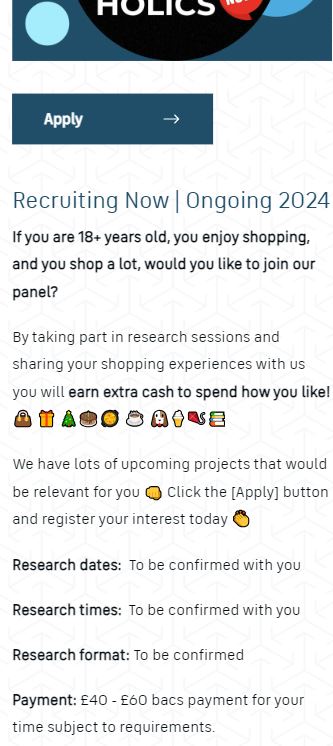
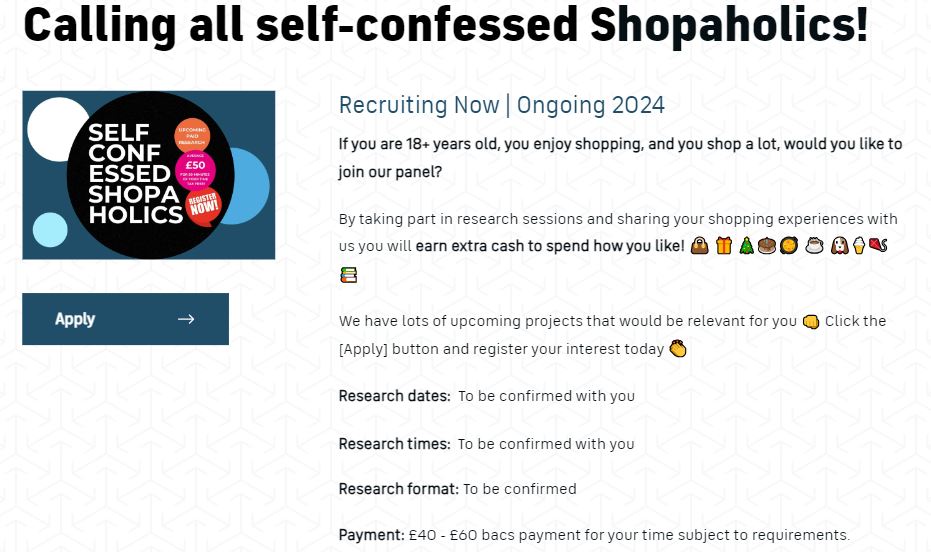
2. Angelfish Opinions
Trustpilot score: 4.8 (266 reviews)
What’s the site like?
Easy to sign up with a great aesthetic and easy userface. You’ll find plenty of availability on all sorts of topics like TV soaps, energy suppliers, dating apps, and user experience testing. Most of these take place online and any in-person sessions are clearly marked.
What do they pay?
The lowest fee we found was £35 for 45 minutes and the highest £85 for one hour. Most payments are bank transfers, via PayPal, or eGift cards.
Any downsides?
Many of the applications ask if you or someone you know works in journalism, marketing, or PR. If it’s a yes, you’re usually excluded, so it’s something to bear in mind.
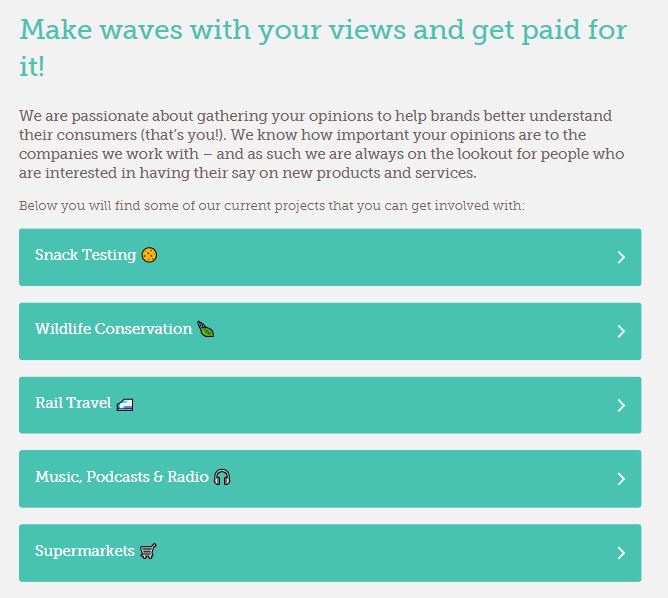
3. Research Opinions
Trustpilot score: 4.8 (259 reviews)
What’s the site like?
Signing up is quick and easy and you can filter projects by online sessions or specific location. We found plenty of opportunities for online-only participants, with topics including music, banking, family, and gaming, as well as career-specific groups for engineers, architects, and teachers.
What do they pay?
The lowest we found was £50 for one hour and the highest was £120 for 90 minutes. Payments are made via bank transfer or vouchers for popular brands.
Any downsides?
While the payments are clearly shown on the opportunities page, you have to click through to see the duration of the group.
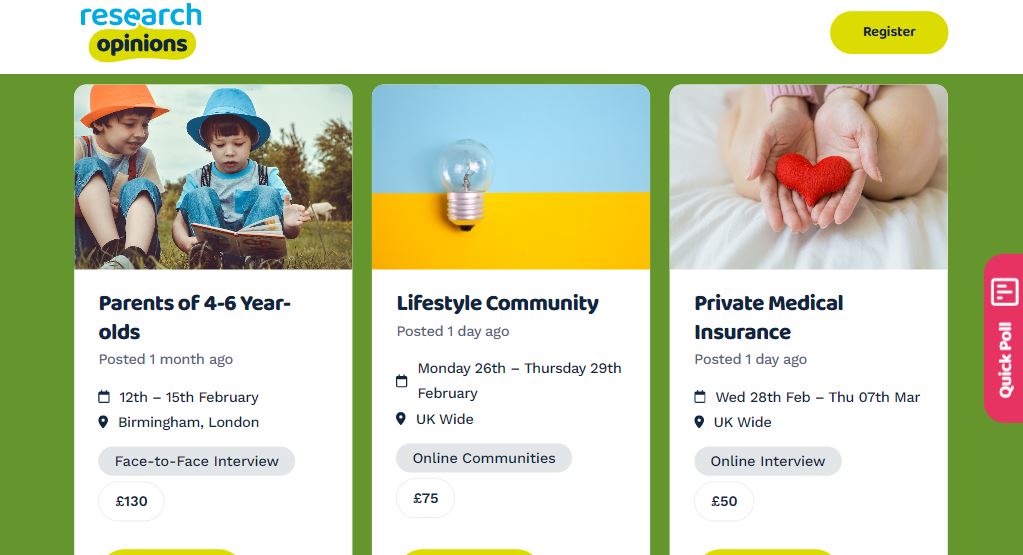
4. Take Part in Research
Trustpilot score: 4.6 (1.8K reviews)
What’s the site like?
Less visually attractive than others, but straightforward to use, with plenty of opportunities. You can filter by a variety of options, including online video calls, online group discussions, in-person user interviews, and in-person user experience testing. Topics include environmental attitudes, banking, office work, travel, and finance, as well as groups specifically for students and parents.
What do they pay?
Most projects hovered around the £50 per one-hour mark. We found some as low as £40 for 90 minutes and one as much as £290 for two 90-minute calls. Payments are made via PayPal.
Any downsides?
It can take a little while to hear back once you’ve applied for a project.
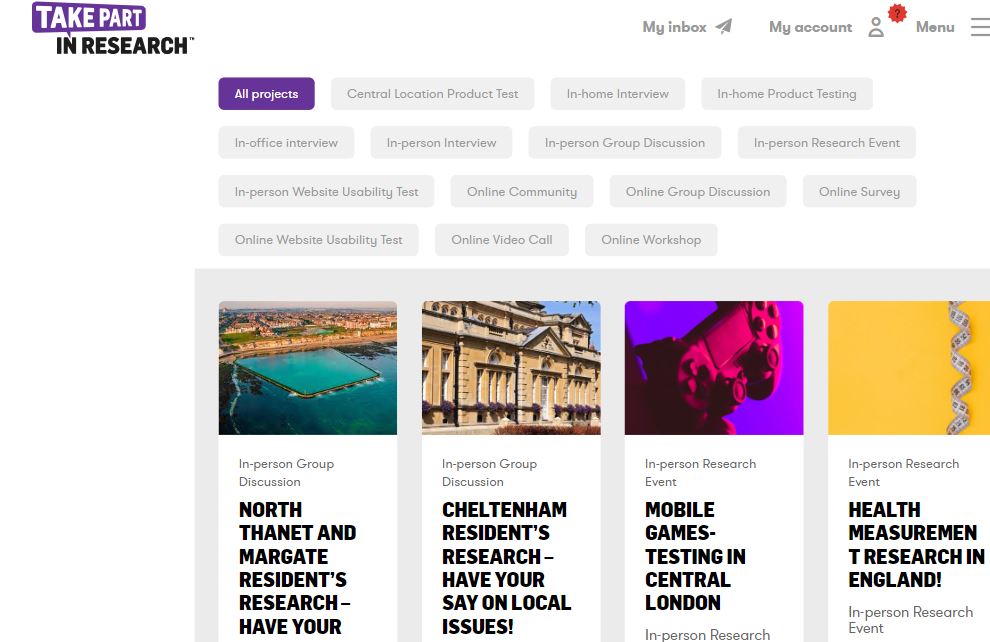
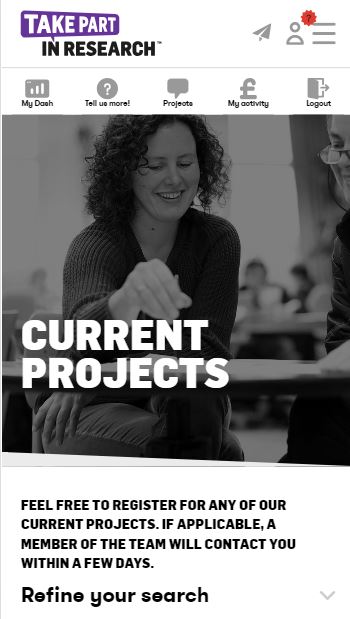
5. Vocal Views
Trustpilot score: 4.3 (679 reviews)
What’s the site like?
The site itself is quite basic but features a variety of current projects that you can filter by. These include focus groups, one-on-ones, and user interviews both online and in person. When we visited the site, there weren’t very many available, although you’re able to view current opportunities without signing up.
What do they pay?
Around £50 for one hour, but we also saw groups that paid £30 for 30 minutes. Several of the projects paid for the pre-task questionnaire, some as good as £15 for 15 minutes.
Any downsides?
Not as many opportunities as other sites.
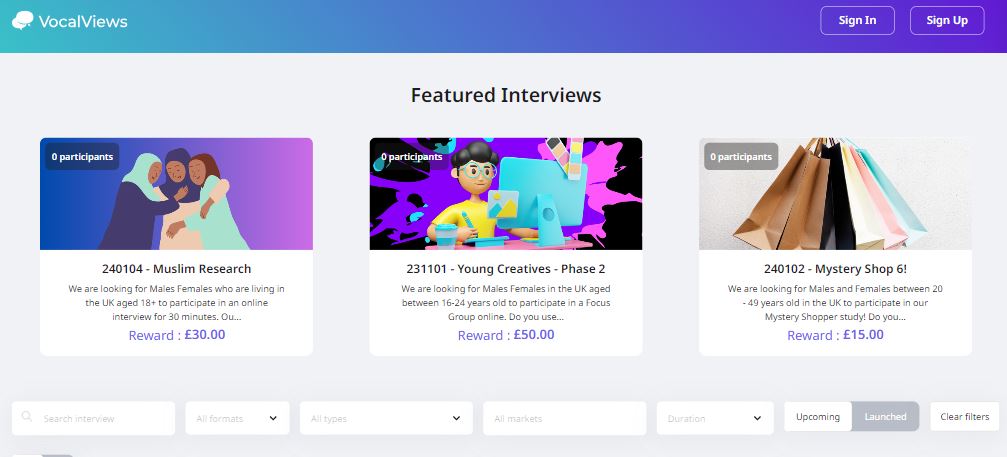
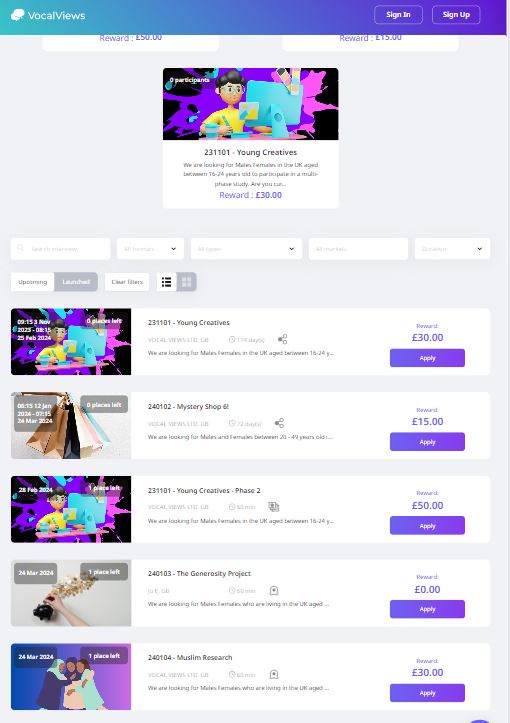

Our top tips for focus groups
Now that you’ve got more of an idea of what focus groups are, we’ve got a few final tips to get started. These pointers will ensure you get the most out of your side hustle so you can earn extra money with ease.
 Sign up for multiple agencies
Sign up for multiple agencies
Increase your chances for opportunities by signing up for as many market research companies as you can. You don’t have to be faithful to any particular agency so you won’t be breaking any rules.
 Create a separate email account
Create a separate email account
If you’re really serious about making money from paid focus groups, you’ll be receiving lots of emails. Set up a separate email account so you aren’t inundating your personal one. Make sure to keep the account name neutral and/or professional; going for something like name+surveys could trigger a spam alert from the site.
 Fill out your profile
Fill out your profile
Some agencies only require basic information, but others will have an option for filling out a more in-depth profile. The more details you give, the more they’ll be able to recommend relevant projects. Some of the questions may cover topics like financial information, so only share what you’re comfortable with.
 Check regularly
Check regularly
High-paying projects get snatched up quickly, so check back regularly for the best ones.
 Speak up
Speak up
During a focus group, make sure you’re sharing your opinion on everything that’s asked. The moderator will make sure everyone has their say; don’t feel the need to go with the majority opinion if you feel differently.

 Think analytically
Think analytically
Sometimes you’ll be asked to watch an advert, campaign, or spend a few minutes on a website. Before you speak, take some time to really think about what’s good, what’s bad, and what could be improved.
 Never lie
Never lie
This counts for in the application process and during the focus group session. It may be tempting to lie about your circumstances so that you qualify for a group, but this could penalise you in the long run. If an agency suspects you’re lying, they could deactivate your account.
 Consider the time-to-fee ratio
Consider the time-to-fee ratio
Paid online focus groups are much more time-effective, but you should still consider the time you’re devoting versus the pay. Since you’re limited on the number of groups you can attend, it’s a good idea to aim for the highest-paying projects.
While most of the groups will take place in one go (one hour, 90 minutes, or two hours usually), some will involve daily tasks. These tasks may be only 15 minutes, but could be hourly tasks every day. Make sure you’re being paid well for your time.
 Apply for topics that interest you
Apply for topics that interest you
Just because you qualify for a project doesn’t mean it’s the one for you. Being selective about what you apply for means you’ll enjoy this side hustle more.

 Use Facebook & forums
Use Facebook & forums
There are plenty of Facebook groups dedicated to focus groups online or in the area. Not only will you find opportunities, but you can chat with other users for tips and advice. You might have luck with online communities like Craigslist, although it’s more difficult to look for and find opportunities.
 Complete voluntary surveys
Complete voluntary surveys
If you receive newsletters for your favourite sites, you might notice you receive requests to fill out surveys – do them. Companies like to get opinions from loyal customers who are willing to give their time and feedback.
This isn’t a sure-fire tactic, but we found it mentioned in forum threads from people with first-hand experience of this working. The bigger the company, the bigger the payout (think Netflix, eBay, Amazon etc).
 Don’t forget about taxes
Don’t forget about taxes
You’re allowed to earn up to £1,000 within a tax year without declaring, but anything over and you need to tell HMRC. It’s unlikely you’ll make more than that with focus groups alone, but you need to include all additional income. So if your side hustles include selling on Vinted, dog walking, and food delivery, make sure you keep track of it all. The tax year runs from April 6th to the following April 5th.

Save money at 5,000+ top-named brands
Sharpen your focus
Focus groups can be great side hustles for making extra money. If you enjoy sharing your opinion, meeting new people, and analysing marketing techniques, why not give it a try? Here’s a quick rundown of the pros and cons before you give it a go:
Pros
- Get paid as much as £200 per session
- Find topics that are interesting to discuss
- Meet and chat with new people
- Use analytical thinking
- No special skills or experience required
Cons
- Limited to one session every three to six months
- Can be restricted if you work in certain fields, particularly marketing
- Need to spend time applying and the rejection rate can be high
- You'll receive a lot of emails
- Payments aren't always bank transfer
Do you regularly take part in focus groups? What are your top tips for getting started? Let us know your experience in the comments below.
